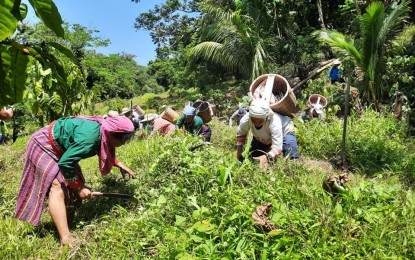
CASH-FOR-WORK. Some residents in Barangay Saguigui, Pagudpud, Ilocos Norte help in the upkeep of a coffee plantation project in this undated photo. Under a cash-for-work program, they are also hired as Barangay Ranger Officers. (Contributed photo)
LAOAG CITY – The Ilocos Norte government is retaining the services of its Barangay (village) Ranger Officers (BROs) this year to safeguard upland forests and watersheds.
Marygail Antonette Killa, head of the Environment and Natural Resources Office (ENRO), confirmed this in an interview Wednesday as over 200 BROs living in the mountainous parts of Ilocos Norte had been tapped to take care of the province’s “Green Wall” project.
The project covers around 8,000 hectares of forest lands and watersheds in the municipalities of Solsona, Marcos, Nueva Era, Dingras, Vintar, and the cities of Batac and Laoag City.
In the past 10 years, the BROs have sustained the province’s local greening program by planting and growing endemic tree species as well as fruit-bearing trees.
According to the ENRO, the ranger's presence has also discouraged the illegal cutting of trees and prevented the occurrence of grass fires, among other threats.
“To sustain our efforts to protect our forests and watershed areas, we need to continue hiring more BROs this year,” Killa said.
A total of 205 BROs were deployed in the mountains to plant more trees and to help guard the area from various threats.
Hiring of BROs also forms part of the continuing cash-for-work emergency employment program of the Ilocos Norte government.
Aside from safeguarding the forests, the recipients also help in social community services in their respective areas such as debris removal, canal de-clogging, garbage separation, material recovery, stockpiling, and clearing operations.
They are also encouraged to grow high-value crops such as ginger, taro, and sweet potatoes which they can sell to sustain their family needs. (PNA)
